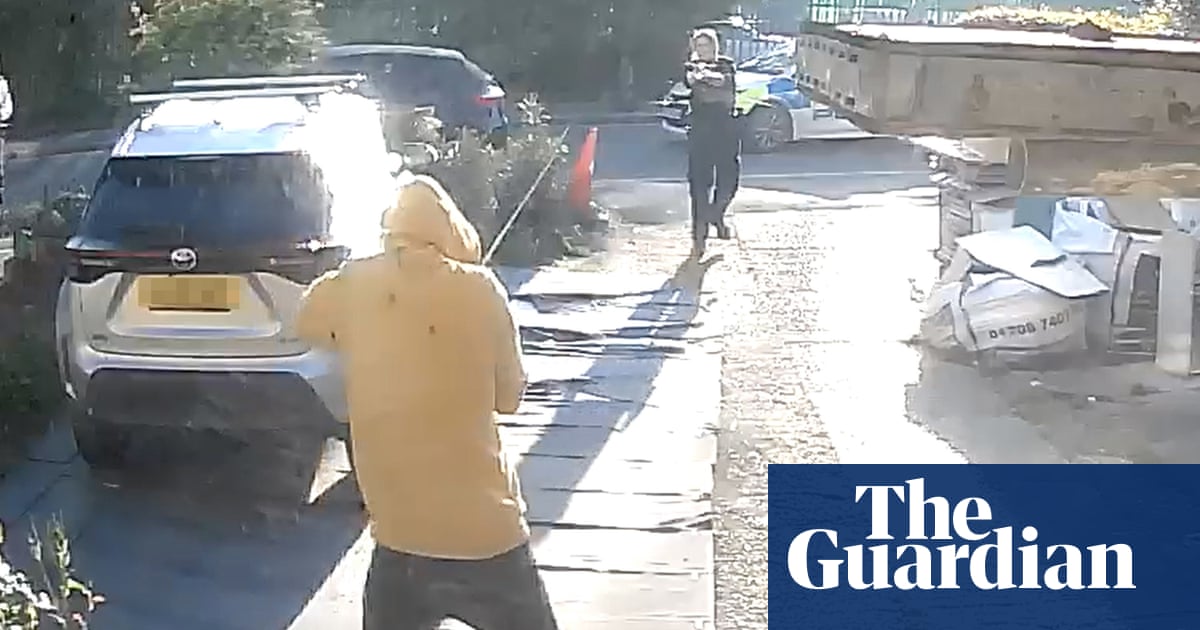
Police body-camera footage released on Friday afternoon shed more light on the brutal hammer attack last October against Paul Pelosi, the husband of Democratic congresswomen and then House speaker Nancy Pelosi.
The shocking video shows officers arriving at the front door of the Pelosi residence in San Francisco and knocking loudly on the door.
Paul Pelosi opens the door and can be seen with an intruder as the two wrestle over a hammer. Police can be heard asking “What’s going on, man?”, then they tell the suspect to drop the hammer. But he says “Nope”, then manages to grab it and swing it and, just off camera, hits Pelosi in the head.
Police charge in to find Pelosi collapsed on the floor, unconscious and struggling to breathe, as they grapple with the suspect, who has fallen on the floor, partially on top of Pelosi, then arrest him.
Pelosi, 82, suffered a skull fracture and injuries to his hand and arm in the attack, requiring him to undergo surgery. He remained hospitalized for nearly a week as he recovered.
The video was released on Friday, after a state judge dismissed efforts by the San Francisco district attorney’s office to keep the footage sealed from the public. The suspect in the attack, David DePape of Canada, faces state and federal criminal charges of attempted murder and assault with a deadly weapon, among others. DePape has pleaded not guilty to the charges.
DePape’s comments to authorities in the wake of the attack indicated his actions were politically motivated. In court testimony last month, a San Francisco police investigator recounted how DePape claimed there was “evil in Washington” and described his initial plans to kidnap the House speaker.
She was in Washington at the time and swiftly flew back to California to be with her husband.
Investigators noted that DePape listed other political figures he wished to target, including the California governor, Gavin Newsom, also a Democrat.
The attack intensified concerns over the growing threat of political violence in the US. In recent months, a number of senior government officials have seen their homes and offices targeted. Last June, a man carrying a gun was arrested outside the home of the supreme court justice Brett Kavanaugh after threatening to kill him.
Members of Congress have reported an increase in violent threats as well, particularly after the deadly Capitol attack on 6 January 2021. The US Capitol police reported this month that the number of its threat investigations dropped in 2022 but remains alarmingly high.
“Everyone continuing to decrease violent political rhetoric across the country is the best way to keep everyone safe,” the US Capitol police chief, Tom Manger, said last week.
Despite officials’ expressions of concern about the rise in violent rhetoric, some rightwing officials and commentators reacted to the attack on Paul Pelosi with mockery. Glenn Youngkin, the Republican governor of Virginia, joked at a campaign event that voters would “send [Nancy Pelosi] back to be with him in California”. Former Arizona gubernatorial candidate Kari Lake responded to the attack by belittling the security at Pelosi’s home in response to the attack.
Some figures on the right went so far as to spread conspiracy theories about the attack, falsely suggesting that DePape held liberal views. DePape’s internet activity actually indicates he promoted far-right beliefs and dabbled in fringe political movements.
In the wake of the attack, many Democrats, including Joe Biden, called on Republicans to use their platform to denounce such violence rather than downplaying it.
“There’s too much violence – political violence – too much hatred, too much vitriol,” Biden said shortly after the attack. “Enough is enough is enough.”
Democrats performed better than expected last November’s midterm elections, but Republicans narrowly won control of the House of Representatives and, after a fraught election earlier this month at the start of the 118th Congress, the California congressman Kevin McCarthy took over the speakership.
Pelosi had announced after the midterms that she would step down from her leadership role while continuing to represent her district in Washington, and she effectively handed the baton to the New York Democrat Hakeem Jeffries, who became House minority leader in the new Congress.
The release of video footage came after a coalition of news agencies, including the Associated Press, sought access to the evidence prosecutors played in open court last month. The San Francisco district attorney’s office had refused to make the exhibits available to journalists.
A state court judge on Wednesday ruled there was no reason to keep the video secret.
The evidence includes Paul Pelosi’s 911 call and video from a Capitol police surveillance camera showing the intruder breaking and entering.
San Francisco deputy public defender Adam Lipson, who represents DePape and had opposed the evidence’s release in a court filing, called the video’s release a “terrible mistake” in a statement on Friday.
After DePape confronted Paul Pelosi in his bedroom, Pelosi tried to make it to an elevator in the home to reach a phone, but DePape blocked his way, authorities previously said. Pelosi then told DePape he had to use the restroom, where his cellphone was charging, allowing him to call 911, during which he had a coded conversation while the intruder can be heard claiming to be “a friend” and telling Pelosi to hang up. Police were dispatched.
Speaking at the US Capitol on Friday after the material’s release, Nancy Pelosi said her husband “is making progress but it will take more time”.
“I have not heard the 911 call. I have not heard the confession. I have not seen the break-in. And I have absolutely no intention of seeing the deadly assault on my husband,” she said.
The Associated Press contributed reporting












